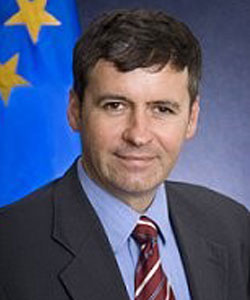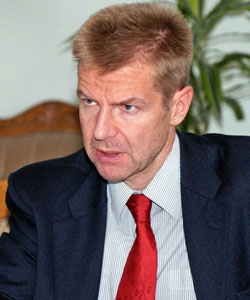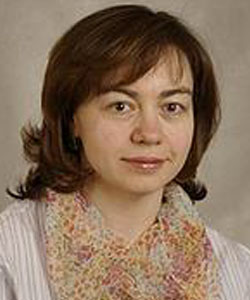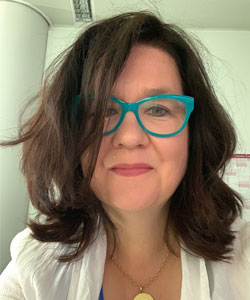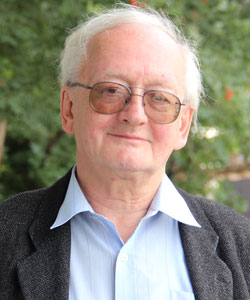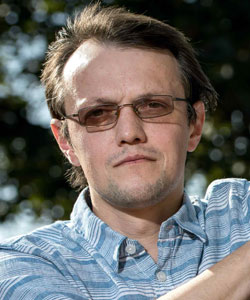|
|
Laurent BOCHEREAU, Ph.D.
Minister-Counsellor, Head of S&T and Other EU Policies Section He joined the European Commission in 1995 where he worked several years as Assistant to the Director for Life Sciences and then Head of Unit with responsibilities for agriculture and food safety research.From 2006 to 2010, he was the Head of the "Science, Technology and Education" Section at the Delegation of the European Union in Washington DC. From 2010 to 2014, he was Head of the "International Cooperation Policy" Unit within the European Commission's Research and Innovation Directorate General with responsibilities for developing the EU international strategy for international cooperation in research and innovation and the international dimension of the Horizon 2020 programme (2014-2020). From 2014 to 2018, he was the Head of the "Science, Technology and Environment" Section at the Delegation of the European Union in Beijing. From September 2018 to January 2020, he was coordinating the EU contribution to the Mission Innovation international initiative on clean energy innovation |
|
|
Richard BURGER
Richard Burger studied at the universities of Vienna (Austria), St.Andrews (Scotland) and Cambridge (England) and holds degrees in mathematics and economics. In his previous positions, Richard worked for the John F. Kennedy School of Government of Harvard University, the Harvard Institute of International Development, the Russian-European Centre for Economic Policy, as Director of the Carnegie Moscow Center, and as Deputy Executive Secretary of INTAS. |
|
|
Irina R. KUKLINA
Executive Director of the International Centre for Innovations in Science, Technology and Education (ICISTE/MNIOP) |
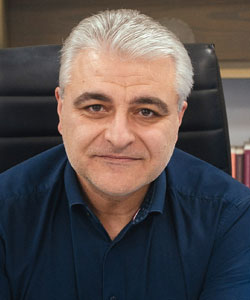 |
Nektarios TAVERNARAKIS Nektarios Tavernarakis is the Chairman of the Board of Directors at the Foundation for Research and Technology-Hellas (FORTH), Research Director at the Institute of Molecular Biology and Biotechnology (IMBB), and Professor of Molecular Systems Biology at the Medical School of the University of Crete (Med UOC), in Heraklion, Greece. He is the Director of the Graduate Program on BioInformatics at the Med UOC, and Head of the Neurogenetics and Ageing laboratory of IMBB. He is an elected member and Vice President of the Scientific Council of the European Research Council (ERC), an elected member of the Academy of Athens, of the European Institute of Innovation and Technology (EIT) Governing Board and Executive Committee, the American Association for the Advancement of Science (AAAS), the European Molecular Biology Organization (EMBO), the German National Academy of Sciences (Leopoldina), the European Academy of Sciences and Arts, and Academia Europaea. He has also served as the Director of the IMBB. He earned his Ph.D. degree at the University of Crete, and trained as a postdoctoral researcher at Rutgers University in New Jersey, USA. His research focuses on the molecular mechanisms of necrotic cell death and neurodegeneration, the interplay between cellular metabolism and ageing, the mechanisms of sensory transduction and integration by the nervous system, and the development of novel genetic tools for biomedical research. He has received several notable scientific prizes, including two ERC Advanced Investigator Grants, and an ERC Proof of Concept Grant. He is the recipient of the EMBO Young Investigator award, the Alexander von Humboldt Foundation, Friedrich Wilhelm Bessel research award, the Bodossaki Foundation Scientific Prize for Medicine and Biology, the Empeirikeion Foundation Academic Excellence Prize, the BioMedical Research Award of the Academy of Athens, the Galien Scientific Research Award and the Helmholtz International Fellow Award. |
|
|
Alice RAJEWSKY Alice Rajewsky graduated in Russian Philology, East European History and Law from the Universities of Cologne and Bonn. In 1999 she received her doctoral degree from Oxford University. In 2000 she moved into research management and joined the German Research Foundation (DFG), where in 2003 she became Programme Director for International Cooperation with Central and Eastern Europe, Russia and the CIS. From 2006 to 2008 she was seconded to the European Commission (DG RTD) as National Expert, working for the Marie Sklodowska-Curie Actions. In 2008 she became Director of the DFG’s Russia Office in Moscow. In 2009 she joined the European Research Council Executive Agency in Brussels, where she currently works as acting Head of Unit of the Social Sciences and Humanities unit of the Scientific Management department. Her main responsibilities are linked to the evaluation process of proposals and scientific follow-up of running ERC-funded projects in the area of Social Sciences and Humanities. In addition, she coordinates support to the ERC Scientific Council as regards the recruitment of ERC panel members. |
|
|
Alexei A. STAROBINSKY Alexei A. Starobinsky is an expert in the field of cosmology, gravity and astrophysics, Staff member of the Landau Institute for Theoretical Physics, Russian Academy of Sciences, Moscow-Chernogolovka, since 1975 (Principal Researcher at present), Principal Researcher at the Laboratory of Theoretical Physics, Joint Institute for Nuclear Research, Dubna, Professor at the Faculty of Physics, National Research University Higher School of Economics, Moscow; ERC Panel Member (2014-2020); Full Member of the Russian Academy of Sciences, International Member of the US National Academy of Sciences, Member of the Leopoldina Academy - the German National Academy of Sciences, Member of the Norwegian Academy of Science and Letters, Foreign Fellow of the National Academy of Sciences, India, and of the Indian National Science Academy; Laureate of the Kavli, Gruber, Friedmann, Tomalla and Pomeranchuk Prizes, and of the ICTP-Dirac, Gold Sakharov, Oscar Klein, Amaldi, Friedmann and Struve Medals. |
|
|
Evgeny SKVORTSOV
Evgeny SKVORTSOV was born in 1982. He is a graduate of Moscow Institute of Physics and Technology and since 2010 a PhD holder from Lebedev Insitute of Physics, Moscow, Russia. |

